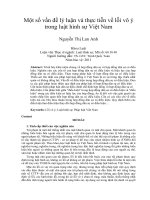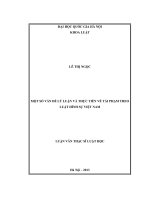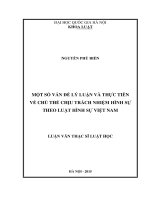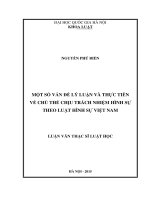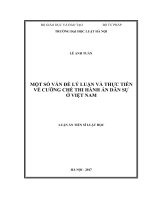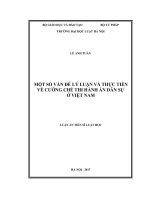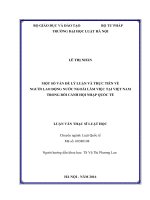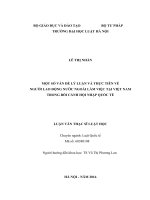Một số vấn đề lý luận và thực tiễn về cưỡng chế thi hành án dân sự ở việt nam astract
Bạn đang xem bản rút gọn của tài liệu. Xem và tải ngay bản đầy đủ của tài liệu tại đây (105.81 KB, 35 trang )
MINISTRY OF EDUCATION AND TRAINING
MINISTRY OF JUSTICE
HANOI LAW UNIVERSITY
LE ANH TUAN
SOME THEORETICAL AND PRACTICAL ISSUES ON THE
ENFORCEMENT OF CIVIL JUDGMENTS IN VIETNAM
Specialized major: Civil Law and Civil Procedure
Code: 62380103
SUMMARY OF DISSERTATIONS
HANOI- 2017
The dissertation is completed at:
HANOI LAW UNIVERSITY
Academic Supervisor: 1. Dr Dinh Trung Tung
2. Prof.Dr Tran Anh Tuan
Reviewer 1: Dr Nguyen Van Cuong
Reviewer 2: Prof.Dr Nguyen Thi Que Anh
Reviewer 3: Dr Le Thi Thu Ha
Dissertation will be examined by the Council of Dissertation
Evaluation at Hanoi Law University at date
Dissertation is available at:
1) National Library of Viet Nam;
2) Library of Hanoi Law University.
/ / 2017
1
PREAMBLE
Execution of civil judgments plays an important role in
contributing to ensuring the effective enforcement of judgments and
decisions which are enforced according to the procedures for civil
judgment execution. Besides convincing the litigants to voluntarily
execute the judgments, in many cases it is necessary to enforce civil
judgments, however, the enforcement of civil judgments directly
affects the property rights and the personal identity of the person to
whom the judgment is enforced and the persons involved, give rise
to, change or terminate the rights and obligations of the subject.
Therefore, the provisions on enforcement of civil judgment must
meet the criteria for ensuring the efficiency of the enforcement of
judgments, against acts of shirking, obstructing, opposing or delaying
the enforcement of judgments, at the same time, it is necessary to
ensure respect for the legitimate rights and interests of the relevant
stakeholders. The provisions on measures, order and procedures for
enforcement of civil judgments should be prescribed in accordance
with the nature of each obligation to be enforced.
The study shows that basic regulations on enforcement of civil
judgments are recognized and enforced by Vietnamese law but have
revealed certain limitations that are one of the causes. The status of
the case remains unsatisfactory to meet the protection requirements
in a timely and effective manner, the legitimate rights and interests of
the judgment creditors and the lawful interests of other litigants in
the enforcement of civil judgments, there is still a lot of work and
civil debt outstanding in the year to move next year, some large cases
2
have not been enforced effectively. Meanwhile, the work of building
and improving the law on enforcement of civil judgment is still slow,
organizing civil judgment enforcement personnel, facilities and
equipment of civil judgment enforcement agencies. It does not meet
the requirements of the reality also affect the effectiveness of
enforcement of civil judgments. Many provisions on enforcement of
civil judgment are not based on theoretical, scientific and rational
theories, but there are also conflicting, overlapping, incompatible
with practical implementation. Civil case awkwardness in the
application of civil enforcement law enforcement, violations in the
enforcement of civil judgment enforcement still take place in many
places, many subject enforcement of civil judgments, various forms
of violations, ranging from the verification of conditions for
enforcement of civil judgment execution, the right to request the
enforcement of civil judgments of the involved parties, the issuance
of decisions on the enforcement of civil judgments, to organize the
enforcement of civil judgments, to pay the proceeds from the
enforcement of civil judgments; every year, many Executors are
disciplined for violating the law while conducting the enforcement of
civil judgments, many cases of violation lead to complicated and
complicated remedies. With very large amounts, be examined for
penal liability to Executors of civil judgment enforcement agencies.
Many civil law enforcement cases are unsuccessful, involving large
forces, at very high costs; the results of enforcement of civil
judgments in many cases have not really protected the interests of
litigants, especially in the case of distraint, property auctions, civil
court execution time long. Many cases where the judgment debtors
3
oppose the enforcement of civil lawsuits, intentionally forfeit or
dispersed property, even destroy the distrained property or selfimmolate to obstruct the examination. Civil litigation. This situation
requires deep research on the enforcement of civil judgments, both
under theoretical and practical law, to clarify the scientific basis for
the development of regulations. On the enforcement of civil
judgments, to assess the current situation of law and to work out
solutions to improve the efficiency of enforcement of civil judgments
in Vietnam. From the angle of the Party's line on judicial reform,
improving the efficiency of the enforcement of civil judgments and
improving the law on enforcement of civil judgments is one of the
important contents of the judicial reform. The way the judiciary is
mentioned in many texts of the Party. The practice of enforcing civil
judgments imposes objective requirements that require in-depth
study on the enforcement of civil judgment and propose solutions to
ensure the effectiveness of this work.
In academia, the study of enforcement of civil judgments in
recent years has been paid attention, there are many research works
expressed in the form of scientific topics, theses, dissertations, books,
essays professional seminars, commentary workshops, reviews
related to the enforcement of civil judgments with different angles of
access. Each approach to enforcement of civil judgment has its
strengths but also has certain limitations. However, at present, there
is not yet any work approaching in-depth and comprehensive
research on the enforcement of civil judgments from the point of
view of theories, laws and practices, especially the new ones. On the
enforcement of civil judgments in the Law on Civil Judgment
4
Execution as well as documents guiding the implementation of the
Law on Civil Judgment Execution. The approach towards intensive
and holistic research on civil enforcement enforcement can connect
and overcome the scathing in the current work on civil enforcement
enforcement of civil judgments. Proposing long-term, fundamental
solutions to improve the law and improving the efficiency of
enforcement of civil judgments in sustainable practice is an urgent
imperative. For the reasons mentioned above, the selection of the
topic "Some theoretical and practical issues on the enforcement of
Civil Judgments in Vietnam" as the thesis topic to clarify theoretical
issues, actual legal and practical costs to implement in order to
propose solutions to better protect the legitimate rights and interests
of the subjects in the enforcement of civil judgments and to improve
the effectiveness of enforcement activities. Civil judgments are
urgent, meaningful both in theory and in practice.
The dissertation aims to systematically study the basic
theoretical issues on enforcement of civil judgments as well as the
practice of enforcement of civil verdicts, clarifying requirements and
enhancing solutions. The effect of enforcement of civil judgments in
Vietnam. The subjects and scope of the study focus on a number of
theoretical issues on the enforcement of civil judgments, the content
of law and the practical implementation of law on enforcement of
civil judgments in Vietnam. Comparing and contrasting with
previous regulations in the history of Vietnamese law as well as
regulations on enforcement of civil judgments of some countries in
the world, orientation for theoretical and evaluation clarification. The
current state of law, especially the limitations and inadequacies of the
5
law and the practical implementation of the law on enforcement of
civil judgments, thus raising the requirements and solutions to
improve the effect of enforcement of civil judgments in Vietnam.
The contents of the dissertation were studied on the basis of the
correct methodology, the science of Marxism-Leninism and Ho Chi
Minh's thought on the state and law, and on the other hand using the
methodology studied. Study other relevant subjects such as: analysis,
proof, comparison, interpretation and sociology, field surveys,
statistics to clarify research issues.
New scientific contributions to the thesis include:
Firstly, the dissertation has systematically and additionally
deepened the theoretical issues on the enforcement of civil
judgments, including the concepts, characteristics, meanings and
principles for enforcement of civil and background judgments, the
science of the development of civil law enforcement regulations,
factors affecting the effect of enforcement of civil judgments, criteria
for assessing the effect of enforcement of civil judgments, to build a
general picture of the formation and development of the law of
Vietnam on enforcement of civil judgments and legal experiences of
some countries on enforcement of civil judgments.
Secondly, the dissertation synthesized and systematically
analyzes the current legal documents in Vietnam to clarify the
current law on enforcement of civil judgment and the enforcement of
enforcement law. Civil litigation, which assesses the results
achieved, the limitations, the existence and causes of limitations, the
existence of civil law enforcement enforcement, both in law and
6
practice of law enforcement. Law on the enforcement of civil
judgments.
Thirdly, the thesis sets out 05 requirements and 03 groups of
measures to improve the efficiency of enforcement of civil
judgments in Vietnam, with the requirements for the establishment of
a socialist rule-of-law State of the people, by the people and for the
people; ensuring human rights, fundamental rights of citizens; to
mobilize the active participation of agencies, organizations and
individuals in the enforcement of civil judgments; appropriate and
serve the renovation policy, the policy of administrative reform,
judicial reform of the Party and the State; to be consistent, feasible
and 03 groups of measures to improve the law, to organize the
enforcement of civil judgments, to ensure the necessary conditions
for the enforcement of civil judgments.
In addition to the introduction, overview of research issues,
conclusions, list of references and appendices, the dissertation is
presented in three chapters as follows:
Chapter 1: Some Theoretical Problems of Civil Enforcement
Enforcement
Chapter 2: Current Legal and Practical Status of the
Enforcement of Civil Judgment Enforcement Act in Vietnam
Chapter 3: Requirements and solutions to improve the effect of
enforcement of civil judgments in Vietnam.
7
OVERVIEW OF RESEARCH ISSUES
At the forum of scientific research in the country and abroad,
there have been many researches and comments related to the
enforcement of civil judgment.
1. Relevance of published works
First of all, regarding the relevance of published works to the
theory of enforcement of civil judgments, it is possible to see that
most of the works have not yet been generalized and easily confused
with the concept of enforcement. Civil law with the concept of
"enforcement measures for civil judgment" does not accurately and
fully reflect the concept of enforcement of civil judgment. Some
works refer to the characteristics, meanings, principles, order and
procedures for enforcement of civil judgments but not yet fully and
profoundly linked to the history of enforcement of law on
enforcement. Civil cases, as well as not deeply reflect the issue of
enforcement of civil judgments in accordance with the law in foreign
countries. Criteria for assessing the effect of enforcement of civil
judgments have not been mentioned.
Secondly, regarding the relevance of the published works to the
current state of law and the practical implementation of civil
enforcement law enforcement, none has fully reflected the current
state of law and practice. To observe the law on enforcement of civil
judgment, with data on enforcement of civil judgments on all
measures for enforcement of civil judgments nationwide; The actual
implementation of civil law enforcement has not been updated in
recent years.
8
Thirdly, on the relevance of the published works to the
requirements and solutions to improve the enforcement of civil
judgment in Vietnam, some projects have raised the requirements
and solutions to enhance the effect. Enforcement of civil judgments
in Vietnam, at certain angles, however, these solutions are only small
for each specific case, but there is no work to present the whole, full
of love. Demand and solutions to improve the efficiency of
enforcement of civil judgments in Vietnam.
2. System of issues covered by the study
Firstly, on the theoretical issue of enforcement of civil
judgment: The dissertation further clarifies the concept of
enforcement of civil judgments, characteristics of enforcement of
civil judgments, clarifies the meaning of enforcement of civil
judgments, basic justification of the development of legal provisions
on enforcement of civil judgments, factors affecting the effect of
enforcement of civil judgments, principles, the criteria for evaluating
the effect of enforcement of civil judgments, the formation and
development of the law on enforcement of civil judgment in
Vietnam, and more clearly the experience of foreign law on
enforcement of civil judgment. history.
Secondly, on the current situation of civil law enforcement in
Vietnam: analyzing and assessing the current situation of law on
enforcement of civil judgment in Vietnam to have the most general
view of the law on the enforcement of civil judgments in Vietnam.
Enforcement of civil judgments; other factors affecting the
enforcement of civil judgments; identify and clarify the causes of
limitations and the existence of civil law enforcement.
9
Thirdly, on the practical implementation of law on enforcement
of civil judgment in Vietnam: The thesis reflects the practical
implementation of the law on enforcement of civil judgment, with
specific data on coercion. To execute 08-year civil cases from 2009
to the end of 2016 (30/9/2016) of each coercive measure of civil
judgment execution and a number of cases of compulsory
enforcement of civil judgments in typical and effective manner, it is
difficult to prove the arguments about the rationale, the inadequacies,
the limitations and the causes of the enforcement of civil judgments
and the procedures for the enforcement of civil judgments under
current law in Vietnam.
Fourth, on the requirements and solutions to improve the
efficiency of enforcement of civil judgments in Vietnam: The
continued research and solutions to improve the efficiency of
enforcement of civil judgments is one the important task that the
thesis solves. Measures to improve the effect of enforcement of civil
judgments are set on the basis of the theories on enforcement of civil
judgments, the assessment of the current state of law and the
practical implementation of law on enforcement of judgments.
Civilian, with criteria for assessing the effect of enforcement of civil
judgments; clarify the requirements for enhancing the efficiency of
enforcement of civil judgments, and propose solutions to improve the
enforcement of civil judgments, such as improving the law on
enforcement civil lawsuits, the organization of enforcement of civil
judgment execution, and the conditions for enforcement of civil
judgment execution.
10
3. Research questions, approaches, hypotheses and expected
results of the thesis
By posing and answering research questions, identifying
directions and proving research hypotheses, projecting the research
results of the thesis project.
Firstly, to systematize and perfect the theoretical foundation on
the enforcement of civil judgments. This is the theoretical basis for
the PhD student to propose solutions to improve the effect of
enforcement of civil judgments in Vietnam.
Secondly, objectively and comprehensively assess the current
state of law and practice of enforcement of civil verdicts in Vietnam,
thereby creating a practical basis for to issue solutions to improve the
efficiency of enforcement of civil judgments in Vietnam.
Thirdly, the requirements for improving the enforcement of civil
judgment enforcement and the development of a system of solutions
to improve civil enforcement enforcement in Vietnam in a
sustainable manner.
CHAPTER 1
SOME MATTER ISSUES ABOUT
CIVIL PROCUREMENT AGREEMENTS
1.1. Concept, characteristics and significance of enforcement of
civil judgments
1.1.1. The concept of enforcement of civil judgments
Enforcement is the use of state power to force certain
individuals or organizations to abide by, which is a mode of use and
assurance of state power exercised by certain remedies and by the
competent authority proceed. Civil enforcement enforcement of civil
11
judgments always use state power to force individuals and
organizations directly involved in the implementation of judgments
and decisions. Enforcement of civil judgment is instituted and carried
out for the specific purpose of executing the enforcement of civil
judgments but the general purpose is to strictly enforce the judgment
or decision to be enforced according to the judgment execution
procedure civil. Therefore, enforcement of civil judgments is the
subject matter of the competent authority exercising the power of the
State to take coercive measures in accordance with the provisions of
law on civil judgment execution to organizations and individuals to
ensure the enforcement to exercise in practice the rights and
obligations already determined in the judgments or decisions to be
enforced according to the procedures for civil judgment execution.
1.1.2. Characteristics of enforcement of civil judgments
- Forcible execution of civil judgments demonstrating state
power, only individuals of functional agencies of the State or persons
of organizations authorized by the State shall have the competence to
conduct civil judgment enforcement.
- Forcible execution of civil judgments is a civil judgment
execution measure but the measure of civil judgment execution shall
be effected through coercive civil judgment execution only when the
judgment debtors fail to voluntarily execute the judgments, except in
special cases, due to the need to prevent acts of dispersal, property
damage or other acts to evade the enforcement of civil judgments.
- Forcible execution of civil judgments applicable to many
subjects, not only the judgment debtors but also to the judgment
debtors or individuals, agencies and organizations with interests or
12
meanings. The case directly related to the performance of the
involved parties' rights and performance of their obligations or the
third person managing the property for civil judgment execution.
- Forcible enforcement of civil judgments applied through the
enforcement of enforceable decisions shall be manifested specifically
by the issuance of decisions of the persons competent to apply
coercive measures to enforce civil judgments.
1.1.3. Significance of enforcement of civil judgments
First of all, the protection of civil law enforcement and
enforcement of law is enforced in practice, that is, the process of
operating for the purpose that legal entities, by their acts, law on the
enforcement of civil judgments in real life.
Secondly, the protection of the legitimate rights and interests of
the State, organizations and individuals and the successful
enforcement of civil verdicts, the judgments and decisions shall be
respected and enforced in practice, the interests of the parties, other
organizations and individuals and the interests of the State.
Thirdly, contributing to raising the legal consciousness of the
subjects in society, making the subjects have thoughts and feelings
expressing attitudes, judgments of fairness or unfairness, right or the
illegality of the law on enforcement of civil judgment.
Fourthly, it contributes to improving the effectiveness of
investigating,
prosecuting,
adjudicating
and
enforcing
civil
judgments, thereby promoting the effectiveness of corrective actions
and overcoming shortcomings, it is committed in the process of
investigating, prosecuting, adjudicating and executing civil cases.
13
1.2. The scientific basis of the development of civil law
enforcement regulations
1.2.1. The elaboration of law provisions on enforcement of civil
judgments on the basis of arguments on civil obligations
1.2.2. The elaboration of regulations on enforcement of civil
judgment must be based on the assurance of human rights and
ownership of the subject
1.2.3. The formulation of regulations on the enforcement of civil
judgments must be clear, transparent and simple as well as ensure the
compatibility and uniformity of the relevant legal system.
1.2.4. The development of regulations on the enforcement of
civil verdicts must be based on the requirements of the practical
implementation of civil judgments in order to ensure the feasibility
and effectiveness of the enforcement of civil judgments.
1.3. Influence factors and criteria for assessing the effect of
enforcing civil judgments
1.3.1. Factors affecting the effect of enforcement of civil
judgments
- The elements of customs and habits, taking into account the
particularities of the national culture and the community cohesion of
the population division in the regions and religions of the subjects
subject to the enforcement of civil judgments.
- Psychological factors, which must be calculated in the civil
law enforcement legislation on enforcement of civil cases, are
appropriate and feasible, and the enforcement of civil judgment
execution must pay attention to mobilization, persuasion and
14
elaboration. The enforcement plan is capable of effectively enforcing
the enforcement of civil judgments.
- Socio-economic conditions are important factors affecting the
enforcement of civil judgments, especially the judgment debtors and
the judgment debtors.
- The intellectual factor, law consciousness, especially of the
litigants, if the litigant has high intellectual level, high sense of law,
will properly perceive rights and obligations on civil judgment
execution according to legal regulations.
- The ability of a competent person to enforce a civil judgment,
the quality and effectiveness of the enforcement of a civil judgment
depends on the capacity of the civil enforcement organization to
enforce its civil judgment Executor, Bailiff.
1.3.2. Criteria for evaluating the effect of enforcement of civil
judgments
- Quantitative criteria
+ The number and the percentage of successful cases of
successful coercion are more effective.
+ The lowest cost of coercive execution of civil judgments, the
lower the cost, the higher the enforcement effect.
- Qualitative criteria
High quality of enforcement of civil judgments is assessed in the
quality of law enforcement of civil judgment enforcement, regardless
of the number of civil law enforcement documents on enforcement of
civil judgment. This is the content of the legislation on enforcement
of civil judgment.
15
The rational use of state power in the enforcement of civil
judgments is not only a matter of specific civil judgment
enforcement but the enforcement of civil judgments in that locality
will then be very favorable.
Ensuring fairness, equality and democracy in the enforcement of
civil verdicts, showing that any person subjected to any judgment
must strictly abide by the decision on enforcement of civil judgment.
Positive change in the perception and behavior of organizations
and individuals in the enforcement of civil judgments, from which
they support the enforcement of civil judgments, minimize obstacles
against the enforcement of civil judgments.
1.3. Principles of enforcement of civil judgments
1.4.1. For enforcement of civil judgments only when there are
grounds prescribed by law, individuals or organizations that have to
execute civil judgments and fail to voluntarily execute their
judgments shall be subject to civil judgment enforcement. To enforce
civil judgments against individuals or organizations must be
grounded.
1.4.2. Enforcement of civil judgments executed by competent
persons, the competent subjects conducting the enforcement of civil
judgments must be prescribed by law to apply the measure of
coercive execution of civil judgments. Depending on the specific
conditions and circumstances of each country which empowers the
subject to enforce the enforcement of civil judgments. In Vietnam
today, the subject has the right to enforce civil judgments as
Executors and Bailiffs.
16
1.4.3. Enforcement of civil judgments by statutory measures,
with specific provisions on how to implement civil enforcement
measures. The more coercive the enforcement is, the more accurate
the enforcement of civil judgments is and the only way to enforce
civil judgments is through enforcement of civil judgments.
1.4.4. Non-enforcement of civil judgments during certain times
and circumstances as prescribed by law is a period of sleep or rest,
usually between 22.00 hrs and 06.00 hrs the following day, holidays,
holidays prescribed by law, customs or habits, or the time of
voluntary execution of judgments or cases where the individuals who
have to execute civil sentences can not fulfill the obligation of civil
judgment execution or property to ensure minimum living for them
or the case for the common good of the community, society.
1.4.5. The enforcement of civil judgments must be based on the
content and nature of the obligation to enforce judgments and
conditions for enforcement of civil judgment enforcement decisions
and to select the application of coercive measures for judgment
execution. Civil liability corresponding to the obligation of civil
enforcement of the judgment debtors and necessary expenses, unless
the judgment debtor voluntarily performs the task or requests the
distraction of the specific property of many properties do not
interfere with the execution of the judgment.
1.5. The formation and development of regulations on the
enforcement of civil judgments in Vietnam
The period before the August Revolution in 1945, although
there were no direct rules governing the enforcement of civil
verdicts, acknowledged the application of compulsory forms of
performance of civil obligations and only Public authorities are
17
allowed to apply. In the period from 1945 to 1989, the law on
enforcement of civil judgments was only stipulated in some sublaws; however, the enforcement of civil judgments is quite
concretized. In the 1989-2009 period, with the enactment of the
Ordinance on the Enforcement of Civil Judgments in 1989, 1993 and
the Ordinance on the Enforcement of Civil Judgments in 2004,
together with a number of legal documents promulgated by the
Government and Ministries, this includes provisions on enforcement
of civil judgments but not yet renewed requiring amendments and
supplements. In the period of 2009 up to now, marked by the Law on
Civil Judgment Enforcement 2008, amended and supplemented in a
number of articles in 2014, and piloted in accordance with
Resolution No.24/2008/QH12 on 14, then end the pilot and
implement nationwide as from 01/01/2016 under Resolution
No.107/2015/QH13 dated 26/11/2015 of the National Assembly.
1.6. Legislative experience of some countries in the world on
enforcement of civil judgments and lessons learned for Vietnam
Legal studies of some countries in the world show that in
general the laws on enforcement of civil law of the country have
many similarities, however, also have their own characteristics. It
can be said that in the world there are many models of civil law
enforcement, each model of civil law enforcement has a positive and
limited aspects. Although the Civil Code enforcement model also
contains provisions on enforcement of civil judgments, which are the
basis for consultation on the improvement of law and application to
the practice of enforcement of civil judgments. Civil cases in
Vietnam.
18
CHAPTER 2
LEGAL AND PRACTICAL STATUS
IMPLEMENTING THE LAW ON COVERAGE
CIVIL LAW EXECUTION IN VIETNAM
2.1. Legal status of enforcement of civil judgment
2.1.1. Current status of general regulations on enforcement of
civil judgment
- There are no provisions regulating the principle of coercive
execution of civil judgments or referring to general principles of law
on civil judgment enforcement in the enforcement of civil judgments;
many new issues stipulated in the Civil Code have not been
concretized in regulations on enforcement of civil judgments; there is
no similar regulation applicable to compulsory return of houses and
land use rights.
- Regarding the role of Judges in the enforcement of civil
judgments, the current law stipulates the subjects subject to the
enforcement of civil judgments as Executors and Bailiffs without
clearly determining the competence of court. Judge the court in the
process of enforcing the civil judgment.
In terms of the system of civil enforcement enforcement
measures, besides its advantages, in terms of legislative techniques,
many of the provisions in a law contain various coercive measures
and a section also contains many the type of coercive measures is not
consistent, so in certain cases it is difficult to specifically identify
each measure of enforcement of civil judgments.
- The time for non-enforcement of civil judgments in accordance
with the laws of Vietnam at certain historical periods varies.
19
- The provisions on assets which are not distrained or handled in
the execution of civil judgments have basically met the requirements
on the assurance of human rights, the humanity and law of the
judgment debtors, however, there is no clarity on what property is
banned from circulation in accordance with the law; it is difficult to
determine which cases are not disturbed, which cases are not handled
property.
- The provisions on verification of conditions for enforcement of
civil judgments are not specific; the order and procedures for
verifying the conditions for the enforcement of civil judgments.
- The regulation on the cost of enforcement of civil judgments,
the current level of spending is still low, is not appropriate to the
actual situation, there is no regulation that the person to be served the
judgment advance the cost of enforcement of civil judgment, causing
difficulties for civil judgment enforcement agencies in the course of
enforcement of civil judgment.
2.1.2. The status quo of enforcement of payment obligations
- On the deduction of money in the account, the time limit for
deduction of money in the account still does not meet the
requirements of the effectiveness of the coercion; the time limit for
voluntary enforcement of the judgment and the time limit for
coercive deduction of money in the account are contradictory; there
are no specific rules on unconstrained amounts in the account.
- Regarding the recovery and handling of money and valuable
papers of the judgment debtors, the current law does not contain
specific provisions on the collection of assets of the judgment
debtors, which are held by themselves; the provisions on the powers
20
of the Executors in the recovery and handling of money, valuable
papers and other property of the judgment debtors are still limited;
there is no strong enough sanction for a third party not to deliver
money, valuable papers or other assets.
- Regarding deductions from the judgment debtors' income, the
conditions of application are still unclear and the deductible level is
not appropriate; there are no specific provisions on income deduction
for specific cases; not yet consistent with the Law on Social
Insurance; there are no specific regulations on sanctions for agencies
and organizations that do not implement enforcement decisions,
except for the income of the judgment debtors.
- Regarding the distraint, the handling of the property of the
judgment debtors, the enforcement of property distraint and the
handling of assets being land use rights are very difficult to
implement in practice, there is no specific regulation on the area The
land left to the judgment debtors upon distraint of the land use right;
provisions on disposal of assets on distrained land are not feasible;
there are no general provisions in general and lack of mechanisms for
dealing with the property of the judgment debtors associated with the
land use rights of others; the provisions of law relating to
enforcement of land use rights are still inconsistent with reality;
dispute, handle intellectual property rights to execute the sentence is
not specific and clear; the provisions on the handling of assets of the
judgment debtors after the court's judgment or decision has not yet
ensured the enforcement of judgments and are unfavorable to the
involved parties; assignment of preserved judgment enforcement
property has been improperly distrained; signing a service contract
21
with a valuer of the distrained property; there is no specific
regulation on how the Executors determine the prices of distrained
property.
- On the exploitation of property of the judgment debtors, which
have been basically set up, have satisfied the requirements of
ensuring the interests of both the judgment creditors and the
judgment debtors. Strictly handle if the judgment debtors or the
persons currently engaged in the exploitation of assets fail to pay
money under coercion decisions to the Executors, they can not
request the judgment debtors or the persons currently engaged in the
exploitation of assets to pay in specific, fixed amount how much
under coercion decision; It is difficult to determine the income from
the exploitation of assets.
2.1.3. Status of regulations on enforcement of the obligation to
deliver and return property
- For coercive return, the law was based on the classification of
property in civil law as the object of the same type or material to
establish the corresponding provisions is quite reasonable. However,
the provisions on coercive return to the person before the
determination of the value of the object is unreasonable, the
conversion mechanism between compulsory return and coercive
payment is unclear.
- Coercive return of houses, house allocation, no specific
regulations on coercion to return houses has changed the current
status, not closely linked roles and responsibilities of relevant
agencies and organizations, the money left to the person executing
the lease is not appropriate to the reality and there is no appropriate
22
mechanism to support the enforcement of the rules on house
repayment.
- Forced delivery, return of papers, anticipated and dissimilar
treatment plans in cases where the papers can not be recovered but
can be re-issued as well as the responsibility of the competent
agencies in the grant. Again papers. However, regulations on the
granting of land use right certificates in civil judgment enforcement
have not created synchronism in the law on land; failure to hand over
or return unsuccessful papers means that the judgment or decision of
the court on the delivery or return of unenforceable documents.
- Enforcement of the land use right transfer, besides the above
advantages, the existing civil law enforcement law also has certain
limitations, such as the lack of updating the regulations on the right
to use the land or surface law of the Civil Code to establish
corresponding provisions on the enforcement of civil judgments.
2.1.4. Actual enforcement regulations for enforcing or not
carrying out certain work
- For enforcement of certain work, the law establishes a
reasonable, flexible and effective mechanism to ensure the
enforcement of the interests of the person who is enforcing a fine, for
other cases where the judgment debtors are liable to bear the costs,
the penal liability examination request has not yet been specified so
as to compel the performance of the obligation to perform certain
jobs; however, there is no specific regulation on how to enforce the
obligation to perform certain tasks.
- Compulsory forcible failure to perform certain jobs, not paying
attention to material sanctions for acts of non-termination of work
23
must not be done in order to ensure the legitimate interests of the
judgment creditors and have many points, the restriction is similar to
the limitation of coercion to enforce certain work.
2.2. Practical implementation of law on enforcement of civil
judgment
2.2.1. Some of the results achieved in civil enforcement
enforcement of civil judgments, the author has spent much time and
effort to study and investigate the practical work of enforcement of
civil judgments in enforcement agencies civil cases nationwide from
October 1, 2008 to September 30, 2016 to review results as well as
shortcomings and limitations for each type of coercive civil judgment
enforcement in practice.
2.2.2. The shortcomings and limitations in the enforcement
practice of civil judgments and causes
- There are also a large number of unsuccessful civil
enforcement cases. The enforced enforcement of civil judgments of
the Bailiff is very limited. There are still errors in the enforcement of
civil judgments, such as improperly determining the judgment
execution competence, leading to coercive jurisdiction and
embarrassment in carrying out the order and procedures for coercive
civil judgment execution. In the development of coercive and
distrained properties. The coordination of agencies and organizations
involved in the enforcement of civil judgments is limited. The facts
of the case are unclear, difficult to enforce and explain the court's
judgment beyond the contents of the judgment leading to problems in
the enforcement of civil judgment still exist. There are many cases of
